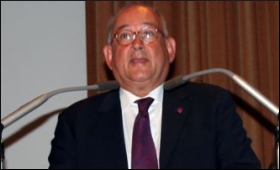|

|
Consolidation need of the hour for SMEs in textile industry
|
|

|
|
| Top Stories |
 |
|
|
|
Namrata Kath Hazarika | 23 Feb, 2010
Indian small and medium enterprises (SMEs) need to consolidate amongst each other which would be beneficial for textile enterprises as they face major costs and energy problems in different regions, said Korkmaz Ilkorur, Board Member of Soktas India in an exclusive interview to SME Times.
Excerpts of the interview...
What are your plans to expand capacity in Soktas India?
Korkmaz Ilkorur: We have plans to reach 12 million meters of capacity in five years in Soktas India, Maharashtra. In Turkey, our plant has 1000 workers producing 11.5 million meters over a year. We have our best capacity. We can increase the efficiency in India by adding machinery & equipment in our weaving unit. Also, increasing capacity in our dyeing and finishing unit. In this way, we will be increasing the production up to 12 million meters in future. We, at present have around 700 employees in India which we probably will increase up to 1000 workers.
What kind of monetary investment will be made in this regard?
Korkmaz Ilkorur: We have already made an investment of USD 45 million. We will be adding another USD 40 million in future.
Are you planning to get into finished garments manufacturing?
Korkmaz Ilkorur: We produce mostly yarn. In turkey, we are not into garments. It is our policy not to be in garments business as a major shareholders. There are people who are willing to go into joint ventures with us. We might also consider those offers, but we will not pick the major responsibilities for that purpose because it is not in our expertise.
Are you being affected by the recent hike in yarn prices, as you import from India?
Korkmaz Ilkorur: Of course, we have been affected by the price hike in India. But we are also procuring yarn from Egypt. We source fibers from other countries. Although we are already using raw cotton from Egypt and using domestic cotton (manufactured in turkey) which helped us to sustain. That is why the hike which was witness recently in India was not much reflected in our business.
Are you planning to set up units beyond Maharashtra?
Korkmaz Ilkorur: At the moment, we have no plans to expand our base in India beyond Maharashtra. Our foreign competitors are looking at the same region. Many designing activities are going on in Bangalore.
What kind of competitive advantages do the Indian market is providing to Soktas?
Korkmaz Ilkorur: I think the competitive advantage is the availability of labour and management in India. India is attracting lots of foreign capital. In fact, not only Soktas, but foreign investors from all over the world are feeling the costs of the management is cheaper in India. That is why I said, India especially in the textile business has potential opportunity.
In India, around 95 percent textile units are small and mid sized businesses. What kind of scope Turkish SMEs in textile sector has in order to set up business ventures in India and vice-versa?
Korkmaz Ilkorur: When we have started to expand our textile business 40 years ago in India, we were a SME. In fact, today there are still more than 60 percent small to medium scale entrepreneurs in the industry functioning especially in the ready-made garment industry. However, many small and mid sized companies cannot work properly as there is costs and energy problems which need solutions in India.
Therefore, we need to consolidate according to the expertise they have. There is need always for transformation in the textile industry. I think in India the small entities should consolidate amongst each other. Huge consolidation is not required, but two or three SMEs can become a cluster which will be beneficial for the industry.
You cannot move up the value chain by staying small. It should be coordinated by the government and by the law as well. Both financial and non financial elements should be involved all together. There will be potential benefits if things are properly managed.
What is the expected turnover Soktas India is expecting in another five years?
Korkmaz Ilkorur: We at present should have a turnover of around USD 30 million which might probably reach to USD 70-80 million in another five years. In Turkey, our turnover currently is around USD 60 million.
|
|
|
| |
|
|
|
|
|
|
|
|
|
|
|
|
|
|
| |
| Customs Exchange Rates |
| Currency |
Import |
Export |
US Dollar
|
84.35
|
82.60 |
UK Pound
|
106.35
|
102.90 |
Euro
|
92.50
|
89.35 |
| Japanese
Yen |
55.05 |
53.40 |
| As on 12 Oct, 2024 |
|
|
| Daily Poll |
 |
 |
| Do you think Indian businesses will be negatively affected by Trump's America First Policy? |
|
|
|
|
|
| Commented Stories |
 |
|
|
|
|
|
| |
|